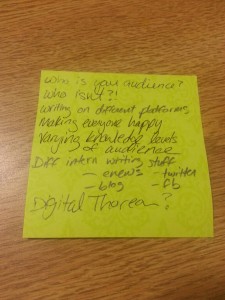
Throughout the semester, many of us have remarked on the connections we seem to find between the courses we’re taking. Sometimes it seems like all the professors have a top secret meeting at the beginning of the semester where they compare class lists and decide on a common thread to subtly (or not so subtly!) work in so we cannot escape it. This semester it was blogging and other forms of online writing. I spent 10 weeks as a public relations and marketing intern for the Alzheimer’s Association, Rochester & Finger Lakes Chapter, which involved a lot of social media writing and learning about blogs. Naturally, I knew I’d wind up writing a blog post about it for this class. So here I am, finally trying to put all the thoughts I scribbled down on a Post-it note throughout the semester into one cohesive blog post that isn’t so long that you all go back to watching cat videos on YouTube halfway through.

There are dozens of connections I could talk about in great detail, but the one aspect of online writing that had the most profound impact on me personally was the idea of writing for different audiences. It hits hardest when you realize that your “audience” happens to be a super vague concept, since anyone who is literate and can open an internet browser could read all of this. You can’t picture them because you don’t know just who they are. Starting my internship at the end of January, I had thought a lot about who I’d be writing for. I figured that this would include people with early-stage dementia, their caregivers, friends, family, and maybe a few other folks from the Rochester area who just happen to be interested in Alzheimer’s education programs and events. For this class blog, I generally go in with the mindset that I’m writing for Professor Schacht, my ENGL 340 peers, maybe some other SUNY Geneseo English students who are avoiding blog assignments for their own courses, and a few other stragglers who happen upon this page.

We all tailor our voice based on the digital environment in which we’re writing. My voice on here sounds much different from the one I used while writing press releases or tweets for my internship, and different still from my personal Facebook posts, such as a recent article I shared about a 13-year old eagle huntress in Mongolia, which I described as “basically the most bad ass thing you can do as a 13 year old.” Obviously that’s not something I’d put in a tweet for the Alzheimer’s Association. I would bet that most of us don’t even think about changing our voice from platform to platform; we just do it naturally.
When I did start consciously analyzing my writing with my audience in mind, it was a little overwhelming. I discovered that the Alzheimer’s Association has followers from all over the country, and all of them have varying degrees of knowledge about Alzheimer’s. They all need something different. How could I possibly write for all of these people? What is an overwhelming amount of information for one is far too little for another. As we all know, the beauty of the digital age is our interconnectedness, but that also means it’s impossible to please everyone. I thought this tied in quite nicely with the discussions we have in the margins of The Readers’ Thoreau. We interact with our classmates, students from the University of Maine, scholars, and Thoreau fans from all over. Chances are you’re bound to say something that someone else doesn’t understand. How do we even begin to broaden our writing to meet the needs of our potential readers?
An 8th grade teacher in Connecticut had his students blog for more than two months, and then gave them a survey asking how writing for a worldwide audience changed the way they write. You can read their unedited responses here. Some of my favorites include:
- “I write what people want to hear.”
- “I wanted to leave a good impression to the higher authorities reading my blog, therefore I wrote with enthusiasm and intelligence, and I wrote of very interesting topics that grasp the readers’ attentions.”
- “It has changed the way I write by just being aware of what people want to see and how well done things have to be. Basically it has made me a cautious writer.”
- “I no longer write pretentiously or just to Amerincans.”
- “It change a major role because i am so use to writing to a teacher and having it grade it and only her and me see it, but now its a bunch o people looking at it. so it became pretty scary and at the same time fun.”
- “It makes me think that I can acomplish great things.”

It’s certainly some valid insight from these 8th graders. I think that bloggers of all ages have experienced a number of these hesitations, thoughts, and realizations. We can’t always write what people want to hear, but we can’t go out trolling just to rock the boat either. We want a balance and to be taken seriously. It makes us cautious and, in my experience, much more thoughtful with our writing. If people don’t understand what we’re talking about, they can look up more or go on living in blissful ignorance; it depends on how invested they are, and there’s definitely something to be said for the ability of a reader to choose. It seems to me that there’s an unspoken agreement between reader and poster. As a reader, you go in with a unique perspective. You either read deeply and thoughtfully, skim halfheartedly, or fall somewhere in between. You may never mention the thing you’re reading to anybody ever again. You might read every word or glaze over the first paragraph and leave. Our time is precious and there’s a plethora of information to be had. Why waste time on something that doesn’t interest you or that you’ll forget the next day? As writers though, I think we get it. Not everything we write is everyone’s cup of tea, and we try our best to accept that. When you have a worldwide audience there’s no way to hold everybody’s attention, so in my opinion, you might as well be true to yourself and write for the ones you will strike a chord with.
